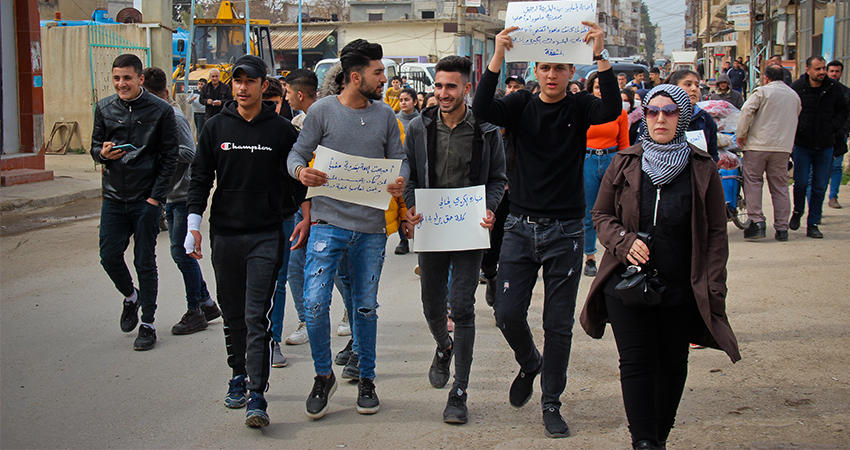Introduction
In this report, Syrians for Truth and Justice (STJ) documents a series of arbitrary arrests in different areas across northeastern Syria, carried out by security forces affiliated with the Autonomous Administration— the Internal Security Forces (Asayish) and Anti-Terror Units (YAT). These arrests were all aimed at civilians, 30 teachers and a media activist, who were all subsequently released. Additionally, STJ discusses the illegal dimensions of the arrests, as the involved security services did not present arrest warrants, adhere to legally established procedures, nor observe relevant international treaties during any of the reported arrests.
STJ documented the arbitrary arrests of 30 teachers over January and February 2021 in the cities of al-Darbasiyah and Amuda, as well as the towns of Rmelan and Maabadah/Girkê Legê in northeastern Syria. These teachers— all subsequently released—were arrested by the Autonomous Administration’s Internal Security Forces (Asayish) for providing high and middle school students with private lessons using the Syrian government curriculum without obtaining an official permit from the administration.
In a separate incident, STJ also documented the arrest of activist Fanar Mahmoud Tammy, 38, on 23 January 2021. Eyewitnesses told STJ that a group of masked gunmen kidnapped the activist from al-Qamishli/Qamishlo city. Later, however, the group was identified as the Anti-Terror Units (YAT) of the Syrian Democratic Forces (SDF).
Tammy— a media and civil activist, as well as a member of the Yekiti Party of Kurdistan (PYK), a party of the Kurdish National Council-Syria (KNC)—was referred to the People’s Defense Court (Anti-Terrorism Court) in Nav Kouri region, near al-Qamishli/Qamishlo. On 11 February 2021, the court ordered the activist’s release.
Tammy’s arrest is an example of the continuous, arbitrary arrests of large numbers of activists and politicians who have opposed the Autonomous Administration’s stance since its establishment. The Anti-Terror Units carried out these arrests following the same pattern. Former detainees interviewed by STJ said that unit fighters often conduct arrests masked, without identifying their affiliation or presenting an arrest warrant. An eyewitness to the kidnapping of Tammy confirmed the systemic nature of these arrests. The so-called “arrest” was conducted by a masked group that did not introduce themselves, present a warrant, nor inform the activist of the charges laid against him.
Similarly, several of the released teachers told STJ that, like Tammy’s case, the Asayish did not introduce a warrant, led teachers to an unknown destination, confiscated their cell phones, prevented them from contacting their families, and denied them access to lawyers. An Asayish official told STJ that they notified teachers earlier of the need to stop giving students private courses based on the Syrian government curriculum. However, most teachers told STJ that they did not receive such notices or warnings from the Autonomous Administration before their arrest.
The release of the detained activist and teachers is a positive step by the Autonomous Administration and the SDF. However, both should recognize that these arrests should have been based on clear legal grounds. Regardless which authority manages Syrian territories, whether they are state or non-governmental actors, all authorities, including the Syrian government, the SDF, and other active militias, must ensure that arrests and detentions are legally defined and carried out under due process of law, in keeping with international customs, treaties, and the rule of law.
Therefore, arrests and/or detentions— even if legally justified— that do not fully adhere to binding procedural codes or involve a violation of the concerned persons’ rights at any stage during the arrest or detention are considered arbitrary and constitute a breach of the following laws and human rights:
1. Arrests Violated Local Laws
The arrests reported herein do not comply with the essential articles of the Charter of the Social Contract to the Autonomous Administration of North and East Syria, instituted on 6 January 2014.[1] The teachers’ and activist’s arrests violate at least three articles of the founding constitutional document, which regulates all aspects of civil and political life:
- Article 20: “The Covenants and international conventions for human rights are an essential part and complements this contract.”
- Article 22: “The Department adopts the International Bill of human rights, the International Covenant on Civil and political rights and the cultural, social, economic and other relevant instruments as an integral part of this Charter.”
- Article 73: “Detaining personal freedom without clues is an offence punishable by law.”
2. Arrests Violated International Laws
As demonstrated by the charter, the Autonomous Administration embraces the Universal Declaration of Human Rights and relevant instruments that stipulate individuals’ right to liberty and details the need to protect this right. However, the arrests that STJ documented over January and February stand at odds with a myriad of articles of both the human rights bill[2] and the International Covenant on Civil and Political Rights of 1966,[3] which the Autonomous Administration deems an integral part of its governance guidelines.
3. The Universal Declaration of Human Rights
- Article 3: “Everyone has the right to life, liberty and security of person.”
- Article 9: “No one shall be subjected to arbitrary arrest, detention or exile.”
- Article 10: “Everyone is entitled in full equality to a fair and public hearing by an independent and impartial tribunal, in the determination of his rights and obligations and of any criminal charge against him.”
- Article 11:
- “Everyone charged with a penal offence has the right to be presumed innocent until proved guilty according to the law in a public trial at which he has had all the guarantees necessary for his defense.”
- “No one shall be held guilty of any penal offence on account of any act or omission which did not constitute a penal offence, under national or international law, at the time when it was committed. Nor shall a heavier penalty be imposed than the one that was applicable at the time the penal offence was committed.”
4. The International Covenant on Civil and Political Rights
- Article 9:
- “Everyone has the right to liberty and security of person. No one shall be subjected to arbitrary arrest or detention.”
- “Anyone who is arrested shall be informed, at the time of arrest, of the reasons for his arrest and shall be promptly informed of any charges against him.”
- “Anyone who is deprived of his liberty by arrest or detention shall be entitled to take proceedings before a court, in order that that court may decide without delay on the lawfulness of his detention and order his release if the detention is not lawful.”
- Article 14: “In the determination of any criminal charge against him, everyone shall be entitled to the following minimum guarantees, in full equality:
- To be informed promptly and in detail in a language which he understands of the nature and cause of the charge against him;
- To have adequate time and facilities for the preparation of his defence and to communicate with counsel of his own choosing;
- To be tried without undue delay;
- To be tried in his presence, and to defend himself in person or through legal assistance of his own choosing.”
It is also essential to mention that international humanitarian law applied to armed conflicts, whether of an international or non-international nature, and several articles of the four Geneva Conventions[4] stipulate involved parties’ commitment to rights and due process while carrying out arrests and detentions against civilians, as well as parties’ obligation to civilians’ rights to a fair trial. Concerned parties must comply with these provisions not only in peacetime but also during armed conflicts.
Methodology
This report draws on a total of 11 interviews. STJ’s field researcher obtained testimonies from five of the teachers arrested and subsequently released by Asayish in al-Darbasiyah and Amuda, as well as the towns of Rmelan and Maabadah/Girkê Legê, for teaching the Syrian government curricula against the orders of the Autonomous Administration. Within the same context, the researcher interviewed a sixth teacher who was also arrested, but for joining a protest that demanded the release of his arbitrarily detained colleagues.
Besides teachers, the field researcher talked to the family members of the detained teachers, among them the wife of a teacher arrested in Amuda city and the brother of another, who was arrested in Maabadah/Girkê Legê town.
To cover all aspects of reported arrest incidents, the researcher also interviewed a female student who was denied private lessons due to her teachers’ arrest in Amuda city, and an official of the Internal Security Forces (Asayish) in al-Qamishli/Qamishlo city, the security group which perpetrated the arrests.
Pertaining to the arrest of the civil and media activist Fanar Tammy, STJ’s field researcher interviewed an eyewitness, who recounted the details of the incident.
The researcher conducted these 11 interviews between 25 January and mid-February 2021, meeting with witnesses either in person or online and consulting a variety of open sources that addressed the arrests. Notably, some witnesses requested that their real names be withheld from the report because the education file continues to be a highly sensitive issue in the areas controlled by the Autonomous Administration.
-
The Arrests, and Subsequent Releases, of 30 Teachers
In this section, STJ documents the arrests carried out by the General Security Service (GSS) of the Asayish against seven teachers in al-Darbasiyah city. These teachers were arrested on 19, 20, 21 January 2021 on charges of teaching the Syrian government curricula “without obtaining an official permission” from the relevant education authorities of the Autonomous Administration. STJ also records the arrests of two other teachers, detained by the same security group, for participating in a protest demanding the release of their colleagues.
The arrested teachers were released in two batches over 23 and 26 January, only after the al-Darbasiyah Notables Council intervened,[5] and the teachers signed a pledge not to teach the curricula of the Syrian government’s Ministry of Education.
Less than two weeks after the first group of teachers was arrested, STJ documented an additional 23 arrests perpetrated by the Asayish and on the same grounds, privately teaching official Syrian curricula to middle and high school students. The Asayish arrested eight teachers from Amuda city and 15 others from the towns of Rmelan and Maabadah/Girkê Legê on 6 and 7 February 2021. These teachers were also released in two batches on 13 and 14 February.
2. An Overview of Curricula across Northeastern Syria
In 2015, the Autonomous Administration of North and East Syria started to impose its own education materials, designed in Arabic and Kurdish. These curricula were first taught in the areas it controlled in al-Hasakah province and only to elementary school students. By 2020, the new educational programs were introduced to all stages of education, including high school.
The Autonomous Administration’s Committee of Education recognizes and uses as many as three curricula. The administration-designed curriculum is taught at schools across the Jazira Region (al-Hasakah province) and the Euphrates Region (Kobanî), as well as at camps for internally displaced people (IDPS), including those designated to people displaced from Afrin, Shabaa camps in the countryside of Aleppo, and all other camps set up in areas the administration governs.
The administration also permits teaching the official curriculum of the Syrian government. After undergoing modifications of some course subjects, this curriculum is taught mainly at education centers and schools in Manbij city, its countryside, and in the adjacent Arima town. The administration also permits teaching UNICEF-adopted curriculum in its territories in al-Tabqa city, Raqqa province, and cities and towns in Deir ez-Zor’s eastern countryside. The Autonomous Administration greenlighted this third educational program following protests by residents in said areas, who refused the administration’s designed course materials.
3. Banning all Forms of Informal Education
In June 2017, the Autonomous Administration issued a circular banning teaching the Syrian government curriculum to students at private teaching centers, or through one-to-one private lessons at students’ or teachers’ homes. The circular said:
“Based on the decision of the Committee of Education in the Jazira Region, all private education centers will be shut down and paid home-taught lessons will be banned. All teachers and owners of such centers are to take heed of the decision and oversee its application, recognizing that offenders will be brought before the public prosecutor.”
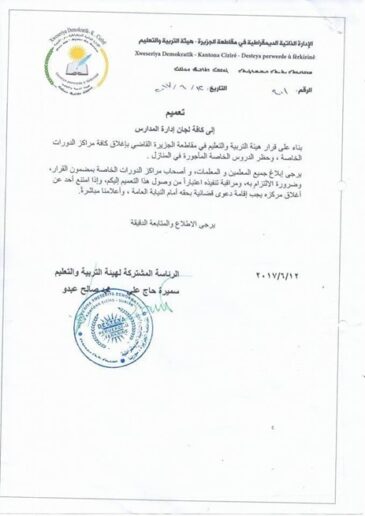
Image 1- Copy of the circular issued by the Autonomous Administration’s education committee in June 2017. Credit: The education committee.
Addressing arrests carried out against teachers, an official of the Asayish in the Jazira Region told STJ that administration forces notified several teachers of the need to stop teaching the Syrian government curricula to Kurdish and Arab students in the areas north of al-Hasakah province throughout 2020. He added that teachers were also informed that incompliance with orders will make them liable to arrest.
The official added that the decision banning teaching educational materials of the Syrian Ministry of Education went into force in 2021, after the Autonomous Administration-designed materials, both in Arabic and Kurdish, were provided to all stages of education and were mandated at schools across the Jazira Region (al-Hasakah province). He added:
“Even though the ban on Syrian government curricula was passed in 2017, it was not effectively enforced till later, because back then the Autonomous Administration had not yet designed its own high school course materials. However, this year the administration introduced its own curriculum to high schools too. Accordingly, the ban was put to force.”
At odds with the official’s account, most of the arrested teachers told STJ that the Autonomous Administration did not notify them of the ban ahead of their arrest.
4. Seven Teachers Arrested in al-Darbasiyah City
In al-Darbasiyah city, the Asayish arrested seven teachers on 19, 20, and 21 January 2021. These teachers were detained on the charges of teaching the Syrian government curriculum to middle and high school students at home or at private education centers. The Asayish arrested two other teachers later for participating in a protest demanding the release of their detained colleagues. All nine teachers were subsequently released.
5. Arrest without a Warrant
On 19 January 2021, the Asayish arrested Arabic language teacher Abdulhamid Aliko, 43, from his home in al-Darbasiyah city. Aliko was released on 23 January but was not presented with a warrant while involved personnel arrested him for teaching high school students the Syrian government curriculum. This is not the first time that Aliko suffers an injustice against his teaching profession, for he was dismissed from his teaching job by the Syrian government about 10 years ago due to his political activism. Commenting on the arrest incident, he told STJ the following:
“On the morning of the arrest day, I was just about to start the lesson when they, [Asayish personnel], knocked on my home’s door. I opened and they asked me to accompany them to their security center. I asked them if they had an arrest warrant. They alleged that they were not there to arrest me, and that they wanted to ask me a few questions only. I refused to go with them at first.”
Aliko said that a member of the GSS of the Internal Security Forces (Asayish) told him— as he refused to accompany them—that they would summon an Asayish patrol and another from the Women’s Asayish, to raid his house and arrest him. Aliko was ultimately forced to yield to their orders. He added:
“They claimed that they would ask me a few questions and then return me home. But within an hour, they arrested five other teachers. They first took us to the GSS’ center in the city. Next, they, about an hour later, transported us to the Asayish’s center. They deposited us together in a single room, with beds, heating, and a TV. The room was monitored by cameras.”
On 21 January 2021, the same forces arrested teacher Abdulkhaliq Khder from a private class. With this arrest, the Asayish had seven teachers from al-Darbasiyah city in custody. The detained teachers were:
- Abdulhamid Aliko (Arabic teacher)
- Idris Sharif (Arabic teacher)
- Muhammad Suleiman (science teacher)
- Dalil Sheikh Mousa (math teacher)
- Idris Aliko (physics and chemistry teacher)
- Ibrahim Suleiman (math teacher)
- Abdulkhileq Khder (classroom teacher)
According to testimonies that STJ obtained from a number of released teachers, each of the teachers was interrogated for over half an hour by GSS officers. The questions were mainly about informal courses they taught, which constituted the charge laid against them. Interviewed teachers said that the officer in charge of the interrogation had informed them that teaching the Syrian government curriculum is forbidden based on a previous decision issued by the Education Directorate of the Autonomous Administration.
6. Statement Slamming Arrests against Teachers
On 20 January 2021, the Kurdish National Council-Syria (KNC) issued a statement denouncing the teachers’ arrests in al-Darbasiyah city.[6] The council said:
“The arrests are incompatible with initial understandings between the council and the SDF command, which provided that students and families will be granted the choice to decide on the curriculum they find befitting and that opening of private education centers and providing private courses of the [Syrian] state curriculum will be facilitated until a UNICEF-recognized curriculum is agreed upon.”
In the statement, the council also demanded that the Democratic Union Party (PYD) release the detained teachers immediately and apologize to them, considering that teachers’ arrests “consolidate and deepen existing disputes.” The council said that “the PYD’s practices are authoritarian. The party is trying to establish monopoly over decision-making and to claim control over the fate of others in various domains, political, economic and educational and cultural.”
7. Protest Decrying Teachers’ Arrest Dispersed with Force
The KNC’s statement corresponded to a protest held on 20 January 2021 in front of one of the Asayish’s centers in al-Darbasiyah city. Dozens of students, their parents, and families of detained teachers carried signs demanding the release of detained teachers and allowing them to continue providing private lessons, especially since only a few months separated students from Syrian national exams for middle and high schools.
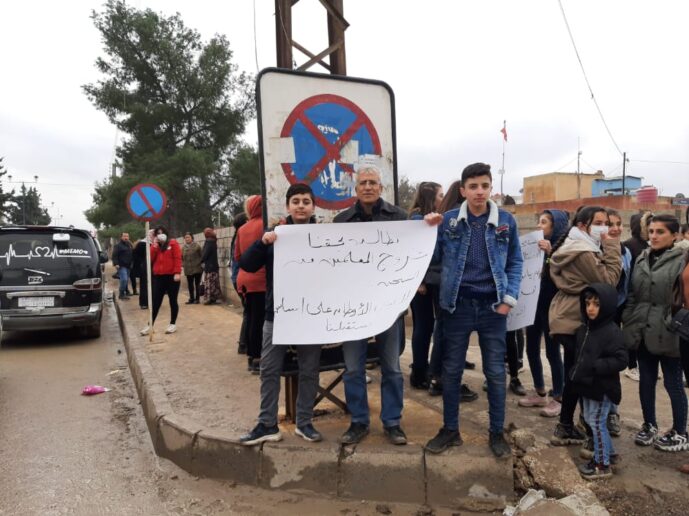
Image 2- Of the protest held in front of an Asayish center in al-Darbasiyah city on 20 January 2021. Credit: Media outlets.
In retaliation, Asayish’s forces used excessive force to disperse the protests and arrested two other teachers—Jihad Aliko and Nizameddin Aliko— with seven male and female students, including Roy Aliko, a minor and the son of one of the teachers detained by the Asayish, Abdulhamid Aliko. Social media activists circulated a video,[7] first published by Russian news agency Sputnik, showing protestors pushing and shoving each other after the Asayish’s assault.

Image 3- Screenshot from the mentioned video, showing the state of chaos that protestors fell into after they were attacked by the Asayish of the Autonomous Administration.
The Asayish released the detained students a few hours after the protestors were dispersed. However, the security forces let the students out only after their parents signed a pledge that prohibited them from joining any other protests, while still keeping Roy Aliko in custody. Nizameddin Aliko, 36, told STJ that the child was released the next day, while he and another teacher, Jihad Aliko, remained in detention for about a week, on the charge of inciting protests. He added:
“In addition to the charge of holding an unauthorized protest, during the interrogation, we were accused of stirring up commotion at the request of certain political parties. The Public Prosecutor’s Office of the Asayish forces also filed a lawsuit against us, charging us with assaulting the Asayish, contrary to what actually happened that day. Four or five Asayish fighters attacked the teacher Jihad, Aliko, and the minor, Roy Aliko, while they arrested them.”
The witness expressed his indignation over the manner of his arrest and the way the Asayish treated him. He recounted the following:
“A number of Asayish fighters shouted several insults at me during the arrest. They also threw me in the prison with criminals and convicted thieves. I was also accused of advocating the al-Ba’ath Party’s curricula and resenting the Kurdish language. My answer was that we took to the streets peacefully and that our demands that they release the detained teachers were not in any way an expression of antagonism towards the Kurdish language. With these demands, we only aimed to help students continue receiving their education before exams.”
8. Hunger Strike in the Prison
In the prison, detained teachers embarked on an open hunger strike. Abdulhamid Aliko told STJ that the strike lasted for three consecutive days and that the teachers refused to eat after they were accused of teaching and promoting the curriculum and agenda of the al-Ba’ath Party, the ruling political party of the Syrian government. He added:
“On the strike’s third day, officers of the Asayish forces and the GSS met us and listened to our demands. We told them that we will not end our strike unless they agree to release us. They made some positive promises and said that the city’s Notables Council was acting to have us released soon. Accordingly, we terminated the strike on the same evening.”
9. Al-Darbasiyah Teachers Released in Two Batches
The Asayish released the detained teachers on 23 January 2021 after the Council of Notables played the intermediary. One released teacher, Abdulhamid Aliko, told STJ that the forces let out seven of the teachers arrested on 19, 20, and 21 January after they signed a pledge not to teach the Syrian government curriculum.
Three days after the first batch was released, the Asayish let out two teachers, Jihad Aliko and Nizameddin Aliko, on 26 January, whom they arrested for participating in a protest that denounced arrests against teachers. Nizameddin told STJ that they also signed a pledge not to protest or teach Syrian government education materials. He added:
“Before we were released, we had a meeting with Asayish officials. Their tone was less sharp and treatment better. One officer told me that he saw my mother and wife on TV demanding my release and asked me not to criticize the Autonomous Administration in the media when I am out. They let us out after we signed a pledge that we will not protest or organize private courses. We signed the pledge against our wishes. If we had not, we might have stayed in prison for who knows how long.”
10. Informal Education in al-Darbasiyah Suspended
Teachers and dignitaries in al-Darbasiyah attempted to convince the Autonomous Administration to permit them to continue providing students with hours left of the private courses they set up for middle and high school students this year. However, all their failed. This promoted 22 teachers to sign a petition. The list of signatures was posted on social networking sites on 6 February 2021. The signatories announced that they will stop teaching due to the pressures they are subjected to and in a response to the failed applications they repeatedly filed to the administration asking for permits or authorizations to continue the private courses for what is left of the school year.
One teacher and a signatory to the petition said that the contents of the list are an expression of the grave injustices middle and high school students suffered from, particularly since only three months are left for national exams. He recounted the following to STJ:
“We asked for the al-Darbasiyah Notables Council’s help to find a solution. The council met with officials from the Autonomous Administration and the Education Committee of the Jazira Region to get us a permit to continue teaching the courses left for the year. However, the council’s requests were all denied. Accordingly, we cannot continue giving students these courses because we are threatened with arrest should we do this.”
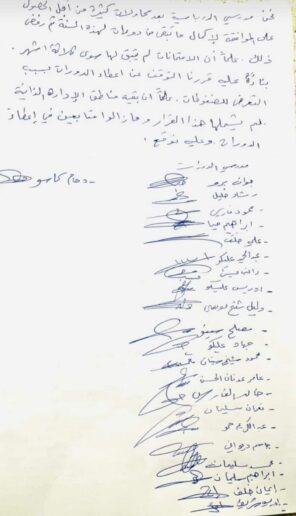
Image 5- Copy of the petition signed by 22 teachers from al-Darbasiyah on 6 February 2021, declaring that they will stop teaching due to pressures they are subjected to. Credit: Witness Abdulhamid Aliko.
11. Other 23 Teachers Arrested in Amuda and Maabadah/Girkê Legê
Less than two weeks after the GSS, affiliated with the Asayish, released the al-Darbasiyah’s teachers, the Asayish embarked on a new wave of arrests on 6 and 7 February 2021. The forces arrested eight teachers from the city of Amuda and 15 others from the towns of Rmelan and Maabadah/Girkê Legê on the charge of providing students with private courses based on the curricula of the Syrian government’s Ministry of Education. STJ’s field researcher obtained the names of the teachers arrested in Amuda city:
- Hussein Naama (math Teacher)
- Talib Asaad (math teacher)
- Radwan Hessou (Arabic teacher)
- Abdulsalam Hesso (Arabic teacher)
- Bankeen Muhammad (physics teacher)
- Jum’a Majido (French teacher)
- Osama Youssef (science teacher)
- Zulfaqar Mahmoud (physics Teacher)
The wife of one of the teachers detained in Amuda told STJ that her husband was arrested on 6 February 2021. He was taken from the classroom as he taught a private course and without a warrant. She added:
“Asayish forces confiscated my husband’s phone and did not inform us of his arrest. I went to the Asayish’s center over 10 times to ask about my husband. Each time, they promised he would be released soon. They did not allow me to see him or check on his condition.”
In the towns of Rmelan and Maabadah/Girkê Legê, the Asayish arrested the following teachers:
- Ahmad Abbas (physics and math teacher)
- Marwan Muhammad (physics Teacher)
- Ali Hajj Ali (Arabic teacher)
- Bashar al-Farra (physics Teacher)
- Muhammad Abdullah (Arabic teacher)
- Muhammad Ahmad al-Hamid (Arabic teacher)
- Lazkin Mahmoud (math teacher)
- Diyar Youssef (math Teacher)
- Fakher Issa (French teacher)
- Tariq Muhammad.
- Atallah Kayaf (math teacher)
- Naji Mousa
- Azad Khaled
- Thamer al-Rashan
Based in Maabadah/Girkê Legê town, a relative of teacher Diyar Youssef told STJ that Asayish called Diyar and asked him to show up at their center in the town. He was arrested at the center on 7 February 2021. The relative added:
“That morning, Diyar went to the Asayish’s center in the town. He informed us of the visit and that he might be arrested like other teachers whom the Asayish had already held in custody. Indeed, we lost contact with him after about an hour. We thought that the forces had probably arrested him and confiscated his phone. We headed to the center and inquired into his situation. There, they told us that he was detained in the Rmelan-based Asayish center. However, they did not allow us to go there to see in what condition he was.”
12. KNC: “Teacher Arrests are Disrupting the Kurdish Dialogue”
The KNC responded to this wave of arrests by publishing a statement on its official website on 7 February 2021,[8] denouncing the arrests carried out against teachers in Amuda and Maabadah/Girkê Legê and demanding their immediate release. In the statement, the KNC listed the names of several of the teachers arrested from Amuda and Maabadah/Girkê Legê, saying that their arrest “is not harmful to students only. These arrests are also spreading terror and concern among people and turning them vulnerable to repression through denying Kurdish youths of joining universities or pursuing education. Moreover, [the arrests] are posing further hurdles to the launch of the intra-Kurdish dialogue and seek to abort any outcomes of the negotiations that Kurdish people have been eagerly anticipating.”
13. Protests Demanding the Release of Detained Teachers in Amuda City
Three days following the arrest of a group of teachers in Amuda city, on 10 February 2021, a number of students and teachers’ families organized a protest. They demanded the release of teachers detained by Asayish for teaching the Syrian government curricula through private courses.
One of the protesting students told STJ that the arrest of teachers is a violation of the students’ right to freedom of education and a negative step which deters education in the region. She added:
“I am not against the Autonomous Administration’s curriculum nor against the Kurdish language. But I am applying for the scientific high school diploma. I opted for studying the government curriculum of the Syrian Ministry of Education with the teachers arrested by the Asayish because I want to study engineering at the University of Damascus.”
For his part, one of the teachers participating in the demonstration told STJ:
“Students’ families have the right to fear for their children’s future and choose the curriculum they believe is the best for them. The Autonomous Administration’s curriculum is not recognized and its affiliated Rojava University, in Qamishli/Qamishlo city, includes a few branches of study and admits only a limited number of students. So, where would students who pass the high school exam go? Is the Autonomous Administration not concerned about these students’ future?”
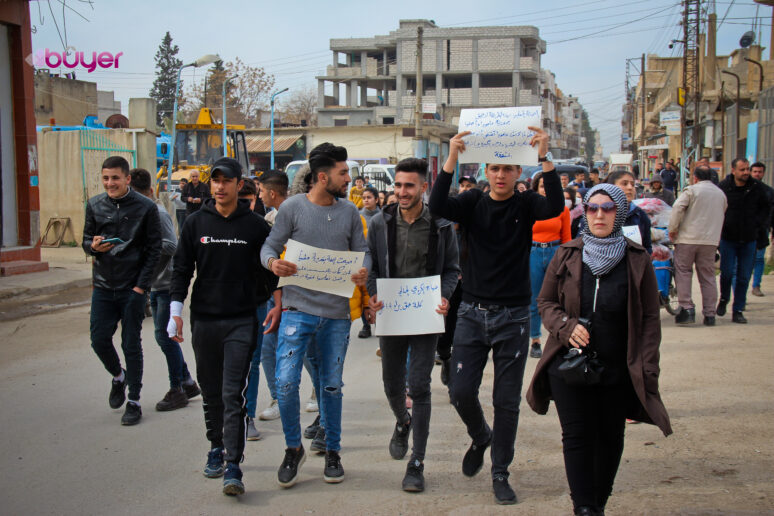
Image 5- Protest held in Amuda city on 10 February 2021, demanding the release of teachers detained by the Asayish. Credit: Buyer Press.
Amuda city witnessed a second demonstration the next day. On 11 February 2021, demonstrators repeated their demands, asking for the release of teachers held by the Asayish.

Image 6- The second protest held in Amuda city on 11 February 2021, also demanding the release of teachers held by the Asayish forces. Credit: Arta FM.
14. Amuda Teachers Released
The Asayish on 13 February 2021 released the eight teachers they arrested almost a week before in Amuda for teaching the Syrian government curriculum through private courses. One of the released teachers told STJ the following: “In exchange for our release, we were forced to sign a pledge not to teach the Syrian government curriculum again, or else we will be held accountable.”
The teacher added that he was teaching the Syrian government curriculum through private courses to about 100 middle and high school students. Now, these students have been denied courses only three months from their final exams.
15. Rmelan and Maabadah/Girkê Legê Teachers Released
On 14 February 2021, the Asayish also released the 15 teachers arrested in the towns of Rmelan and Maabadah/Girkê Legê, eight days after they were detained for running unauthorized informal education programs based on the Syrian government curriculum.
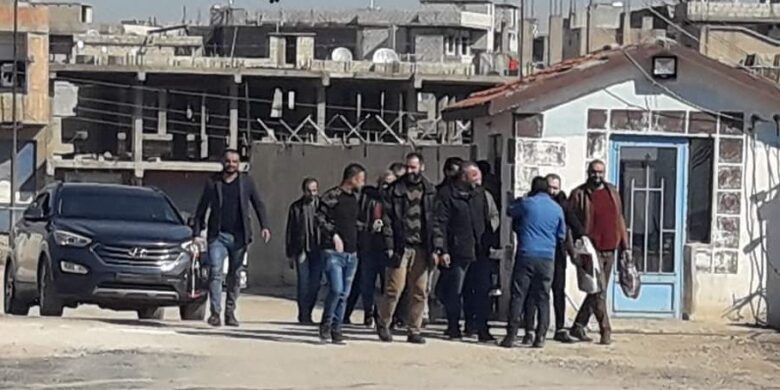
Image 7- The release of several teachers detained in the town of Maabadah/Girkê Legê on 14 February 2021, eight days after they were arrested by the Asayish forces. Credit: Media activists.
-
Activist Fanar Tammy Arrested in Qamishli/Qamishlo City
The series of arbitrary detentions carried out by security services of the Autonomous Administration against civilians in northeastern Syria were not limited to teachers. On 23 January 2021, an unidentified armed group kidnapped activist Fanar Mahmoud Tammy, 38, in the city of Qamishli/Qamishlo, which the Autonomous Administration and the Syrian government share control over. Tammy is a member of the Yekiti Party of Kurdistan (YPK)—one of the KNC’s parties in Syria—and is known for his activism in media and civil fields. He suffers from several health problems, including diabetes and cornea issues.
An eyewitness from the kidnapping site told STJ that a masked group riding a van abducted Fanar Tammy near the Lazkin Gas Station, while on his way to visit a friend. He added that the group was later identified as operating under the Anti-Terror Units (YAT), an affiliate of the SDF. The witness recounted additional details on the incident:
“This kidnapping occurred before evening. Fanar Tammy was riding his motorcycle, and as soon as he parked it in front of his friend’s shop, whom he intended to visit, a number of masked gunmen surrounded him, stuffed him into their van, and kidnapped him. The group did not introduce themselves or present Tammy with a warrant. The group were suspected of being affiliates of the Autonomous Administration or the SDF, which turned out to be the case in the end.”
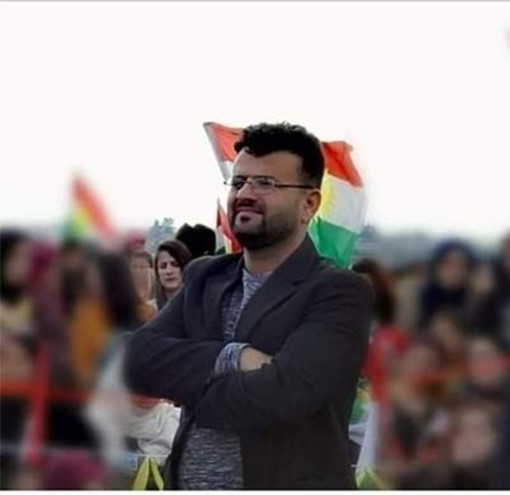
Image 8- The activist Fanar tammy. Credit: Local Facebook pages.
A day after Tammy was arrested, on 24 January 2021, the General Assembly of the KNC published a statement accusing armed men of the PYD of kidnapping the activist and leading him to an unknown destination.[9] The KNC said that recurrent kidnappings of activists and teachers “fall under the decision of the PYD’s command to pose obstacles to any potential Kurdish understanding and aim at negotiations which Kurdish people in western Kurdistan look forward to.”
STJ’s field researcher reported that the kidnapping of the activist Fanar Tammy unleashed a massive wave of criticism against the Autonomous Administration on social media. Commentators expressed solidarity with the abducted activist, denounced the method he was captured, and demanded his immediate release.
Responding to popular and official resentment, the General Command of the Internal Security Forces (Asayish) in the Jazira Region issued a statement to the public on 25 January 2021.[10] The Asayish denied having any link to the activist’s kidnapping, saying: “We declare that our forces did not arrest the media activist, and we reaffirm our full commitment to rights of detainees in line with the laws and rulings relative to detainees, which are applied in accordance with international laws and our effective local laws, passed by the Legislative Council of the Autonomous Administration.”
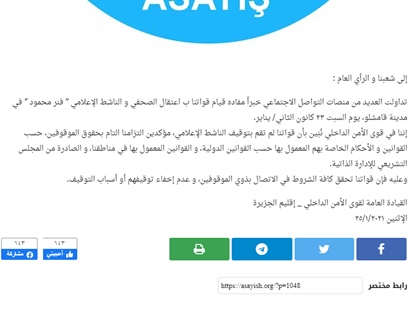
Image 9- Copy of the statement made by the Asayish, denying responsibility for arresting the activist Fanar Tammy. Credit: Official website of the Internal Security Forces-North and East Syria.
Four days after the Asayish’s statement, on 29 January 2021, the Autonomous Administration-linked Hawar News Agency published an article[11] claiming that activist Fanar Tammy is involved in intelligence-sharing activities that pose a threat to the region’s security.
The agency reported that Tammy was arrested by a warrant issued by the Public Prosecution of the People’s Defense Court, and that the reason for his arrest was his involvement in intelligence-led activities against the Autonomous Administration of North and East Syria.
The agency quoted a source from the People’s Defense Court, saying that concerned authorities are continuing to interrogate Fanar Tammy regarding charges against him and that he will duly be referred to the People’s Defense Court once the investigation is completed.
The article provoked mixed reactions and was widely criticized by activists and media figures, most of whom deplored the arrest method and the way the case against Fanar Tammy proceeded. Commentators considered the incident a dangerous indicator threatening workers in the public domain and spreading mistrust among them.
The Anti-Terror Units (YAT) brought the activist Fanar Tammy before the People’s Defense Court (Anti-Terrorism Court) in Nav Kouri region, near al-Qamishli/Qamishlo.[12] The court ordered his release on 11 February 2021, 20 days after his kidnapping.
_________
[1] “The Charter of the Social Contract to the Democratic Autonomous Administration in the Jazira Region,” PYD, 6 January 2014, https://pydrojava.org/%D9%85%D9%8A%D8%AB%D8%A7%D9%82-%D8%A7%D9%84%D8%B9%D9%82%D8%AF-%D8%A7%D9%84%D8%A7%D8%AC%D8%AA%D9%85%D8%A7%D8%B9%D9%8A/?fbclid=IwAR14ZvAggYsznh5MYMnKLO-_2hLy3inuALoGxlvZs24szIl2UHVn6i1AZmY (Last visited: 2 April 2021).
[2] “The Universal Declaration of Human Rights”, UN, https://www.un.org/en/about-us/universal-declaration-of-human-rights (Last visited: 31 March 2021).
[3] “The International Covenant on Civil and Political Rights”, OHCHR, https://www.ohchr.org/en/professionalinterest/pages/ccpr.aspx (Last visited: 31 March 2021).
[4] “Geneva Convention (IV) relative to the Protection of Civilian Persons in Times of War (1949)”, OHCHR, https://www.ohchr.org/EN/Issues/Education/Training/Compilation/Pages/4GenevaConvention(IV)relativetotheProtectionofCivilianPersonsinTimesofWar(1949).aspx (last visited: 3 April 2021).
[5] A civilian committee encompassing dignitaries and prominent religious figures from the city, who work on solving disputes and other community problems.
[6] “Statement on Arrests of Teachers by Security Services of the PYD’s Administration.” KNC, 20 January 2021, https://www.r-enks.net/?p=29059&fbclid=IwAR15O-oXdQ8Eb21xeTSX0mkbU8hZ5gj8A2wxt-qKRYU7oeG0RcyKnUp3ahk (last visited: 3 April 2021).
[7] For more: https://www.facebook.com/AlalamyDlkhazBhlwy/videos/410083046917690/
[8] “Statement by the General Assembly on the Renewed Kidnapping Campaign against Teachers,” KNC, 7 February 2021, https://www.r-enks.net/?p=29593 (last visited: 3 April 2021).
[9] “Statement on the Continued Kidnapping of Kurdish Activists,” KNC, 24 January 2021, https://www.r-enks.net/?p=29202 (last visited: 3 April 2021).
[10] “Statement Made by the General Command of the Internal Security Forces-Jazira Region,” ISF-North and East Syria, 25 January 2021, https://asayish.org/2021/01/25/%d8%a8%d9%8a%d8%a7%d9%86-%d8%b5%d8%a7%d8%af%d8%b1-%d8%b9%d9%86-%d8%a7%d9%84%d9%82%d9%8a%d8%a7%d8%af%d8%a9-%d8%a7%d9%84%d8%b9%d8%a7%d9%85%d8%a9-%d9%84%d9%82%d9%88%d9%89-%d8%a7%d9%84%d8%a3%d9%85%d9%86-4/?fbclid=IwAR1j41ualJc68OlxDgK_n3Wvgm1W5T6ewpTpGTqc9oyo6GQSvcIajKlAbws (Last visited: 3 April 2021).
[11] “Source from the People’s Defense Court: Fanar Tammy Involved in Intelligence-Led Activities that Pose Threat to the Region,” Hawar News Agency, 29 January 2021, https://hawarnews.com/ar/mobile/?page=haber&ID=45527 (last visited: 4 April 2021).
[12] The People’s Defense Court— also called Terrorism Court—is located in Nav Kouri region, near the city of Qamishli /Qamishlo. It oversees crimes classified as terrorist acts under the anti-terrorism law.

